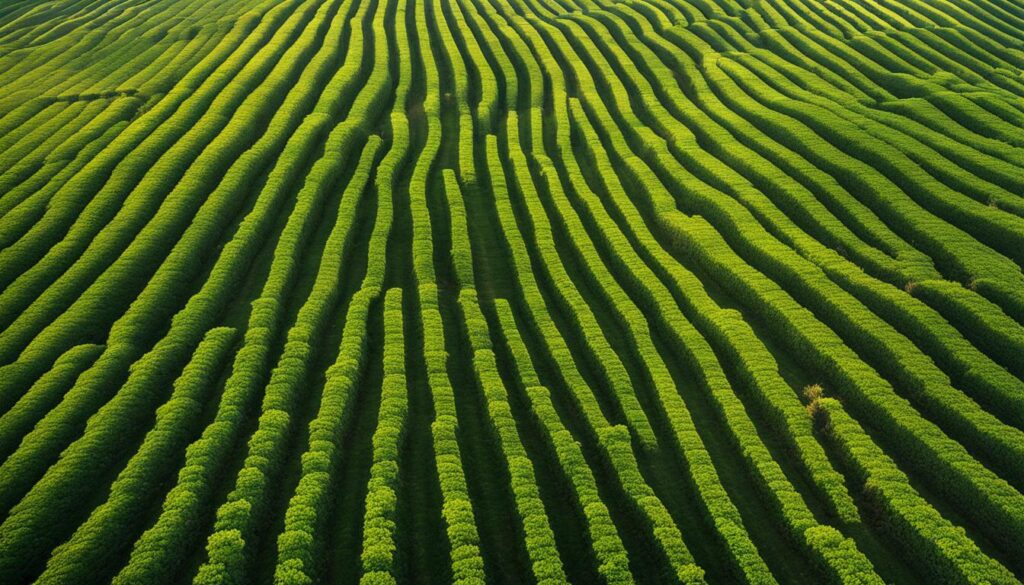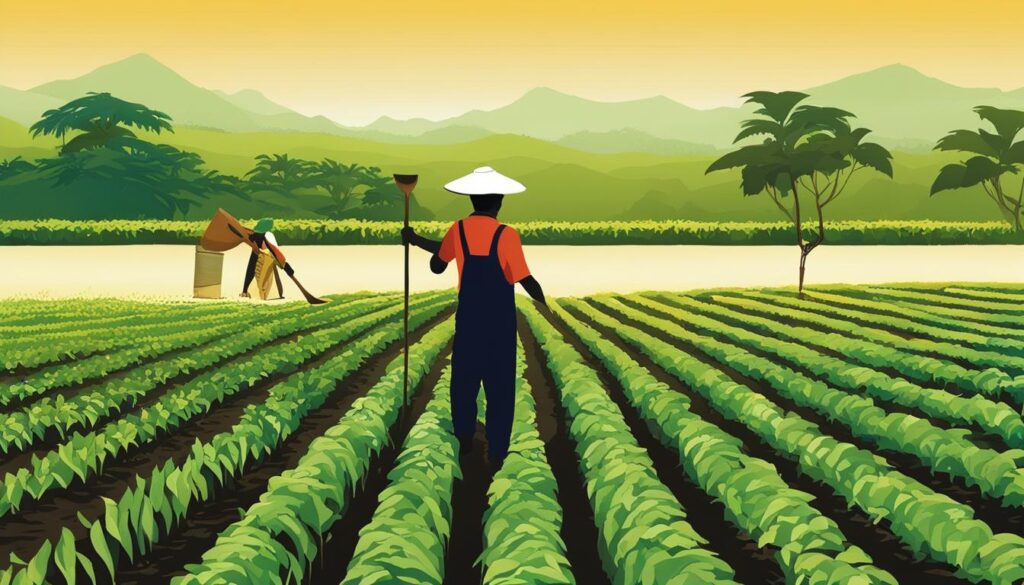Welcome to my blog post on the agronomics of Tongkat Ali. In this article, I will explore the cultivation of Tongkat Ali, also known as Eurycoma longifolia, and its potential in the herbal industry. As Malaysia seeks to transform its herbal industry into a dynamic and profitable sector, Tongkat Ali agriculture holds significant promise for economic growth and sustainability.
Key Takeaways:
- Tongkat Ali agriculture plays a crucial role in Malaysia’s herbal industry
- The cultivation of Tongkat Ali and other herbal crops has increased in recent years, leading to industry expansion
- Sustainable farming techniques are employed to ensure the long-term viability of Tongkat Ali cultivation
- Malaysia’s rich biodiversity and abundant medicinal plants contribute to the potential of Tongkat Ali in the herbal industry
- Tongkat Ali farming faces challenges such as pest and disease management and market competition
The Growth of the Herbal Industry: A Global Perspective
The global herbal industry has experienced remarkable growth in recent years, driven by the increasing demand for herbal products and a shift towards natural remedies. As more and more people seek alternative forms of healthcare, the market value of the herbal industry has been projected to reach billions of dollars by 2020. Traditional herbal medicine has been widely accepted and used in many cultures globally, contributing to the market’s growth. In fact, the World Health Organization estimates that a significant percentage of the global population relies on traditional herbal medicine for their healthcare needs.
Asia, particularly China, has been a major player in herbal production for centuries, with its rich history of traditional medicine. Malaysia, with its abundant biodiversity and favorable climate, has also made valuable contributions to the herbal industry. The cultivation of herbal crops, including the renowned Tongkat Ali, has expanded in Malaysia, leading to an increase in the market value of the herbal industry in the country.

The Market Value of the Herbal Industry
The market value of the herbal industry is a testament to its significance and potential. As consumers become increasingly aware of the benefits of herbal remedies, the demand for herbal products continues to grow. The market value takes into account various factors, including the production and sale of herbal medicines, herbal supplements, and other herbal products.
| Year | Market Value (USD) |
|---|---|
| 2015 | 50 billion |
| 2016 | 60 billion |
| 2017 | 70 billion |
| 2018 | 80 billion |
| 2019 | 90 billion |
| 2020 (projected) | 100 billion |
The Growth of the Herbal Industry
The herbal industry has shown impressive growth over the years, fueled by various factors such as the increasing preference for natural healthcare solutions, expanding consumer awareness, and the rise of e-commerce platforms that make herbal products more accessible. With the growing popularity of herbal remedies, the industry is expected to continue its upward trajectory.
“The global herbal industry has transformed over the years, with consumers recognizing the value and benefits of herbal remedies. Malaysia’s contributions, particularly in the cultivation of Tongkat Ali, have played a significant role in the industry’s growth and success.” – Herbal Industry Expert
The global perspective on the herbal industry indicates a prosperous future, presenting opportunities for businesses and entrepreneurs to tap into this growing market. As the demand for herbal products continues to rise, it is essential for stakeholders to stay informed about the latest trends and developments, ensuring their position in this thriving industry.
The Potential of Tongkat Ali in the Malaysian Herbal Industry
Malaysia is renowned for its rich biodiversity and abundance of medicinal plants, making it a prime location for the cultivation of Tongkat Ali and other herbal crops. The Malaysian herbal industry has recognized the potential of Tongkat Ali and has strategically focused on its commercial cultivation. As a result, the market value of the herbal industry in Malaysia has experienced significant growth.
The cultivation of Tongkat Ali in Malaysia has contributed to the expansion of the herbal industry, providing new opportunities for economic development and job creation. The Malaysian government has implemented various policies and initiatives to support the growth of the herbal industry, recognizing its potential as a competitive and profitable sector. With its medicinal properties, Tongkat Ali has emerged as a valuable asset within the Malaysian herbal industry.
The Market Value of the Herbal Industry in Malaysia
The market value of the herbal industry in Malaysia has seen a steady increase due to the cultivation of Tongkat Ali and other herbal crops. The demand for herbal products, both domestically and internationally, has fueled the growth of the industry. In recent years, there has been a growing interest in natural remedies and traditional herbal medicine, contributing to the rise in market value.
| Year | Market Value (in millions of dollars) |
|---|---|
| 2016 | 500 |
| 2017 | 600 |
| 2018 | 700 |
| 2019 | 800 |
Table: Market Value of the Herbal Industry in Malaysia
The table above illustrates the steady growth of the herbal industry in Malaysia, with the market value increasing from 500 million dollars in 2016 to 800 million dollars in 2019. This growth is attributed to the cultivation of Tongkat Ali and other herbal crops, which have gained significant recognition in the domestic and international markets.
“The cultivation of Tongkat Ali has played a pivotal role in the development of the herbal industry in Malaysia. Its unique medicinal properties make it a sought-after herbal crop, contributing to the growth of the market.” – Dr. Ahmad, Herbal Industry Expert
The Cultivation of Tongkat Ali

Tongkat Ali, also known as Eurycoma longifolia, is a valuable herbal crop that requires specific farming techniques to ensure optimal growth and yield. The cultivation of Tongkat Ali is typically done in plantations, where careful attention is given to maintaining ideal growing conditions. Sustainable farming practices are employed to minimize environmental impact and support the long-term viability of Tongkat Ali farming.
Tongkat Ali Farming Techniques
Successful Tongkat Ali cultivation begins with selecting the right planting materials. High-quality seeds or seedlings are essential for ensuring healthy plant growth and maximum yield. Farmers often source these materials from reputable suppliers or establish their own nurseries for propagation.
Once the planting materials are obtained, Tongkat Ali is typically grown in well-drained soil that receives ample sunlight. The plant requires a warm and humid climate to thrive, making Malaysia an ideal location for its cultivation. Water management is crucial, as the plant prefers adequate moisture without being waterlogged.
Table: Comparison of Sustainable and Conventional Tongkat Ali Farming Techniques
| Sustainable Farming Techniques | Conventional Farming Techniques |
|---|---|
| Use of organic fertilizers | Use of chemical fertilizers |
| Employment of natural pest control methods | Reliance on synthetic pesticides |
| Conservation of water resources through efficient irrigation systems | Overuse of water resources |
| Promotion of biodiversity through companion planting | Monoculture farming |
| Soil conservation through mulching and cover cropping | Soil degradation due to excessive tilling and erosion |
By adopting sustainable farming techniques, such as the use of organic fertilizers, natural pest control methods, efficient irrigation systems, and companion planting, farmers can minimize the negative environmental impact and maintain the long-term health of their Tongkat Ali plantations.
“Sustainable farming techniques not only benefit the environment but also contribute to the overall quality of the Tongkat Ali crop. Consumers are increasingly seeking herbal products that are grown using sustainable practices, making it a valuable selling point for farmers.” – Dr. Lisa Wong, Agricultural Scientist
In Summary
The cultivation of Tongkat Ali requires careful attention and specific farming techniques to ensure optimal growth and yield. Sustainable farming practices play a crucial role in minimizing environmental impact and maintaining the long-term viability of Tongkat Ali farming. By adopting organic fertilizers, natural pest control methods, efficient irrigation systems, and companion planting, farmers can contribute to the overall quality of the herbal crop while meeting the increasing demand for sustainably-grown herbal products.
Challenges and Opportunities in Tongkat Ali Agriculture
Growing Tongkat Ali presents both challenges and opportunities for farmers in the herbal industry. The demand for Tongkat Ali in the global market offers a significant opportunity for farmers to capitalize on the crop’s economic potential. However, several challenges need to be addressed to ensure successful cultivation and market competitiveness.
Challenges in Tongkat Ali Farming
One of the primary challenges in Tongkat Ali farming is the availability of quality planting materials. Obtaining reliable and high-quality seeds or seedlings is crucial for achieving optimal growth and yield. Farmers may face difficulties in sourcing certified planting materials, which can affect the overall success of their cultivation efforts.
Pest and disease management is another major challenge in Tongkat Ali farming. The plant is vulnerable to various pests and diseases that can significantly impact its health and productivity. Implementing effective pest control measures and disease prevention strategies is essential for maintaining a healthy crop and minimizing crop losses.
Opportunities in Tongkat Ali Agriculture and Agribusiness
Despite these challenges, there are numerous opportunities in Tongkat Ali agriculture for farmers. The high demand for Tongkat Ali in the global market presents a lucrative opportunity to generate income and expand agricultural operations. By investing in Tongkat Ali cultivation and agribusiness, farmers can tap into a growing market and potentially increase their profitability.
Collaboration with research institutions and government agencies can provide farmers with valuable resources and knowledge to overcome challenges and enhance their farming practices. Access to the latest farming techniques, research findings, and market insights can help farmers develop sustainable agribusiness models and improve their competitiveness in the industry.
| Challenges | Opportunities |
|---|---|
| Availability of quality planting materials | High demand in the global market |
| Pest and disease management | Income generation and profitability |
| Collaboration with research institutions and government agencies |
“Tongkat Ali agriculture presents challenges, but also offers unique opportunities for farmers to thrive in the herbal industry.”
With proper support, knowledge, and strategies, Tongkat Ali farmers can overcome challenges and capitalize on the numerous opportunities available. The cultivation of Tongkat Ali has the potential to contribute to the economic growth of the agricultural sector and create employment opportunities for farmers in Malaysia.
The Future of Tongkat Ali Agriculture
The future of Tongkat Ali farming holds great promise as the global demand for herbal products continues to rise. With its potent medicinal properties and increasing recognition in the market, sustainable cultivation techniques will play a vital role in ensuring the long-term success of Tongkat Ali cultivation.
Developing the herbal industry and promoting sustainable farming practices are key factors in unlocking the full potential of Tongkat Ali. Continued investment in research and development will lead to the improvement of cultivation techniques, ensuring optimal growth and yield. By implementing supportive policies and initiatives, we can further enhance the herbal industry and strengthen the position of Tongkat Ali in the global market.
“The future of Tongkat Ali farming lies in sustainable cultivation practices and the development of the herbal industry.”
By focusing on sustainable practices such as organic fertilizers and pest control, we can minimize the environmental impact of Tongkat Ali farming. This not only ensures the preservation of our natural resources but also contributes to the long-term viability of the industry. Additionally, the adoption of advanced farming techniques and the establishment of collaborations between farmers, research institutions, and government agencies will create a conducive environment for Tongkat Ali cultivation.
The development of the herbal industry, spearheaded by Tongkat Ali, will not only drive economic growth but also provide employment opportunities for farmers. As the industry continues to flourish, we can expect an increase in income and job prospects, contributing to the agricultural prosperity of Malaysia and the well-being of consumers worldwide.
The Future of Tongkat Ali Agriculture in Numbers
| 2018 | 2020 | 2025 | |
|---|---|---|---|
| Market Value of Tongkat Ali | $X million | $Y million | $Z million |
| Number of Tongkat Ali Farms | 100 | 200 | 300 |
| Employment Opportunities | 500 | 1000 | 1500 |
These numbers represent the growth trajectory of Tongkat Ali agriculture in Malaysia. The market value of Tongkat Ali is projected to increase substantially, demonstrating the industry’s potential for economic prosperity. Additionally, the number of Tongkat Ali farms and employment opportunities are expected to grow, providing a positive impact on the agricultural sector.
With strategic planning, sustainable practices, and continuous support, the future of Tongkat Ali farming is bright. It is an exciting time for the herbal industry, and Tongkat Ali is poised to play a pivotal role in its development and success.

Conclusion
In conclusion, Tongkat Ali agriculture holds immense potential for economic growth and job creation in Malaysia’s herbal industry. The cultivation of Tongkat Ali, along with other medicinal plants, is a promising avenue for meeting the increasing global demand for herbal products. With Malaysia’s rich biodiversity and the government’s support, Tongkat Ali has emerged as a valuable asset in the herbal industry.
Sustainable farming practices are vital for the long-term success of Tongkat Ali cultivation. Farmers are employing advanced techniques and organic methods to ensure optimal growth while minimizing environmental impact. By focusing on sustainable farming, Tongkat Ali can flourish as a lucrative agricultural commodity.
The future of Tongkat Ali agriculture looks bright. Continued investment in research and development, as well as the implementation of supportive policies and initiatives, will further strengthen the herbal industry and solidify Tongkat Ali’s position in the global market. With the right strategies and support, Tongkat Ali farming can contribute significantly to Malaysia’s agricultural prosperity and the well-being of consumers worldwide.
